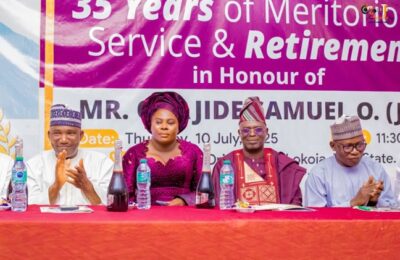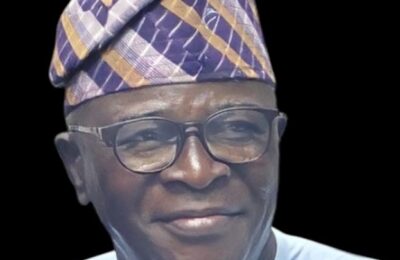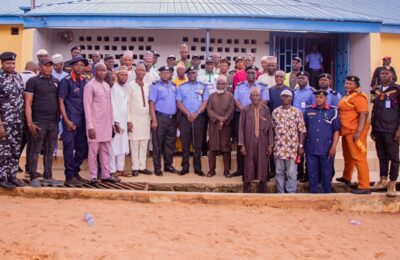Chief Sunday Awoniyi died in a London hospital two weeks after he had an accident on the Kaduna-Abuja expressway on November 28, 2007 but not in the minds of friends, associates and those he mentored or who knew him among his own, the Okun people of Kogi State.
Low keyed as it may, remembrance of his remarkable years as a bureaucrat and politician highlighted the activities marking the fifth anniversary of his demise. He was aged 75 years. The memoriam began with prayers offered at the deceased grave side in Mopa his home town, on Wednesday, November 28, followed by caring for the widows and less privileged in Mopa on Saturday, a visit to the special persons and uplifting of the school of the deaf and dumb. Curtains were drawn on the ceremonies at First Baptist Church, Mopa where a thanksgiving service was held on Sunday, December 2, 2012.
Awoniyi, who would have been 80 this year, was remembered variously for his contributions towards the building of the civil service in Northern Nigeria and network of friendships and political alliances, which endured for many years; as one of the most detribalized Nigerians to ever live; Yoruba of Okun descent, from North Central, a Christian and minority who successfully led Muslim and majority Hausa/Fulani dominated Arewa Consultative Forum (ACF)! He was remembered for his last active days, thickened by organized resistance to tenure elongation project of former President Olusegun Obasanjo.
He was remembered for falling victim of the murky and vindictive Nigerian politics culminating in his uncelebrated exit from the Peoples Democratic Party, which he helped organized and nurtured to what the ruling party became, and subsequently, from active politics. Led by Governor Idris Wada, prominent sons and daughters of Okunland and Kogi State who attended the Sunday thanksgiving service for the soul of the departed Aro of Mopa widely remembered Sunday Bolorunduro Ipineteyan Awoniyi as the brightest political star to have shone from the old Kabba Province and as the father of modern day Okun politics.
Awoniyi, many recalled, started out his stint in active politics between the 1980s and 2000, recruiting young politicians to help actualize his vision for the Yoruba speaking people in the North, many of whom are still alive today.
Ideologically, the Okuns largely identified with their kith and kin in the western region which saw them embracing Action Group (AG), the mainstream Yoruba political association of the first republic. However, since the Okun area fell under the geographical territory of the old Northern region, now North Central zone, the Okun people, in the 1960s, could not benefit from the slogan: “Freedom for All, Life more Abundant”, which was the trademark of the AG led government. These include free education, free health and employment, enjoyed freely by the Yorubas in the core west. Yet, the four legislators from Okunland in 1979 were elected on the tickets of the defunct Unity Party of Nigeria (UPN). Because of this, the National Party of Nigeria (NPN), the dominant party in the north, which later controlled government at the centre and the old Kwara State level, made no impact in the Okun area. The closest the Okuns got to uhuru was when in the 1983 general elections UPN captured Kwara, which in any case was short lived by the Buhari/Idiagbon-led military intervention, three months after Cornelius Adebayo, an Igbomina, was sworn in as governor.

Handful evidences of development witnessed in Okunland at that time were as result of community self-help and the missionaries. Awoniyi had come up with the agenda that would see all that changed and from there he established what was called OYI Indigene, which started as a socio-political organization and later transformed into a political platform. It was a forum created chiefly to help actualize the vision of the late Chief Awoniyi, which was to draft Okun people into the mainstream politics of the North.
He worked closely with young politicians he recruited and they started out together during the formation stages of the defunct National Republican Convention (NRC). His followers testified to the fact that he did not hide his feeling that he believed that the Okun people must belong to the core politics of the North and that to do that, they must try to ostracize themselves from the politics of the south west.
He had come under severe criticisms from those who saw his efforts as being unsolicited for. However, under his leadership, his group had produced the third republic governor and deputy governor of the newly created Kogi State, in the aborted third republic, precisely 1991. He was elected as senator, Kogi West zone and Okun area ever since has remained very vibrant in the nucleus of the PDP.
Despite these electoral successes, left wing politicians less agree that Awoniyi succeeded in drafting Okun people from the left political leaning of the core Yoruba to the right wing Northern political leaning. Awoniyi, they agree, became an institution by own nationalist attributes, which goes beyond his role in Okun politics.
Okun people are republican by nature and would readily reject the modus operandi of any north-based conservative political movement as antithetical to the world view of the Okun nation. It did not matter to them that ACF which Awoniyi led is not an ethnic organization. It is not peculiar to any ethnic group. Therefore that Okunland has never been close to ACF was what the late former super permanent secretary learned to live with.
Folorunsho Daniyan, son of the late Chief Silas Daniyan, Awoniyi’s contemporary and another foremost politician from Okunland, affirming Awoniyi had his rights to his opinion that Okun’s place in Nigerian politics lies with the North, once told a reporter:
“That is a matter of opinion. As a leader, he thought the best way to get his people what they want is by aligning with the north, which he knew all his life. He has said repeatedly that it was not his fault that Kabba Province (Kogi State) is grouped with the North. For him that was his best way of helping his people and he pursued it with all his energy. In some aspect of it I agree with him because himself and I discussed it several times. I knew where he was coming from, after all I’ve been a beneficiary of the old North. So, I could feel it and I appreciate him for it.”
But Chief Awoniyi means more to many people including his kinsmen in Okunland whose placement of the Aro of Mopa in their hearts transcend his Arewa connections. Unlike the late sage, Chief Obafemi Awolowo, Awoniyi didn’t start early in his life as a politician; he started as a career civil servant. While Awolowo started as a crusading politician and impacted and expanded political principles that caught up with a large population of Nigerians, with south west as base, Awoniyi was not a crusading politician but he achieved a great deal in his chosen aspects to earn for himself institutional attributes. That nobody can take away from him. He became more outspoken as ACF Chairman and was more appreciated by more Nigerians for his consistency, boldness, truthfulness, forthrightness and other attributes found in any great nationalist.
Some of the prominent Nigerians of Okun extraction whom the late Awoniyi influenced their rise in their chosen careers and monitored their progress, one of the positive impacts of his leadership, included late Acting Inspector General of Police, Alhaji Ahmadu Sheidu, Dr. Roland Adeleye and Dr. Eyitayo Aiyetoro, both former federal commissioners and a host of other beneficiaries. The construction of the Ilorin -Kabba road, which Awoniyi instrumented when he was super permanent secretary in the First Republic remains unforgettable. Awoniyi was seen more of a bureaucrat than a politician who played vital roles in the elevation of Okun politicians in Kogi State during his brief but eventful stint in partisan politics. In 1999, Chief Awoniyi came close to installing the first ever governor of Okun extraction, when he influenced the emergence of Dr Stephen Olorunfemi, now late, from Kabba, as gubernatorial flagbearer of the PDP on inception in 1999.
Indeed, Clarence Olafemi, one of Awoniyi’s lieutenants in the 80s became the Speaker of Kogi State House of Assembly and later, Acting Governor, following the nullification of the election of former Governor Ibrahim Idris by the Appeal Court in February 2008, thus becoming the first ever Okun man to occupy the 1901 Lugard House, albeit in acting capacity. Till date, Awoniyi’s scion, Yomi, is number two man in the power hierarchy in Kogi State having been nominated as running mate to the winner of the September 22, 2011 governorship primaries of the PDP, Capt Idris Wada and the success of the joint ticket in the December 3, 2011 general election held in the state.
A major debate of the issue of a successor had not ensued and this is understandable advancing Clarence Olafemi’s views in an interview granted a national daily about two years ago as guide: hear him: “Time is the biggest factor in getting a worthy successor bearing the novel style of leadership that Chief Awoniyi defined in the lives of his people. Nature abhors vacuum, it has never happened in history that there will be a long vacuum when a personality dies. But you see, one thing you have to note about Chief Awoniyi was that his time was different from the present time. When he was in the public service,
Nigeria was different from what it is now. To that extent, one cannot compare. But definitely, somebody will emerge some where.”
Excerpts from another viewpoint, this time, Folorunsho Daniyan reads: “I really can’t see anybody who is going to play that role; who has that enthusiasm and the vision, because from the time Chief Awoniyi became less and less active in politics, the politics of Okunland, both intellectually and colour wise became a shadow of itself. So, I really don’t see anybody, not in the nearest future, especially his national stature.”
Granted that General David Jemebewon (Rtd) has played the role of a successor, chairing major meetings and ad-hoc elders’ forums, both at PDP and non-partisan levels, including the ill-fated search for a consensus Okun gubernatorial candidate in 2011 under the auspices of Okun Peoples Forum, it may well still be too early in the day to address the issue of a successor.
Jemibewon, at 73 and pedigree wise, at the moment, stands tallest in the Kogi Yoruba political set up and has been the Baba that has been looked up to in the absence of the Mopa duo. He (Jemibewon) didn’t just start getting involved yesterday. He had done it since the patriarch (Awoniyi) quit the stage of politics in 2002. Jemibewon instituted the Okun Forum in his Iyah-Gbedde home stead and midwifed the political transition in 1998/1999.
Another old Awoniyist, Chief Sam Ola Akande whom Awoniyi single handedly made Deputy Governor in the aborted third republic became the rallying point in Yagba axis. They were two prominent beneficiaries of Awoniyi’s leadership. But it was Jemibewon who has, up to date, followed the late Aro of Mopa religiously. Other notable Awoniyists around are Engr Funsho Ako, Alhaji Isa Adeboye, Clarence Olafemi and Dr Kayode Ige. Billionaire business mogul, Bashorun Jones Jide Omokore, remains the biggest factor sustaining Awoniyi’s legacies in Okunland and beyond.
A financier of PDP, Omokore was the unseen hand that nominated Yomi as Wada’s running-mate in the December 3, governorship poll.
Much as he posited to be his own man, the stature of Awoniyi, the father, has continued to cast a shadow over Awoniyi, the son. The Deputy Governor enjoys a great deal of cooperation from his boss and the synergy has thrown upon the shoulders of the younger Awoniyi huge responsibilities that no Nigerian state deputy governor in recent history, measured. And, besides flagging the name Awoniyi in his current position as number two man in Kogi State, he has become a rallying point for the Okuns and a major decision maker, as the highest political office holder at the state level from that axis.
Ralph Omololu Agbana is Media Assistant to Kogi State Governor (Research & Documentation)





